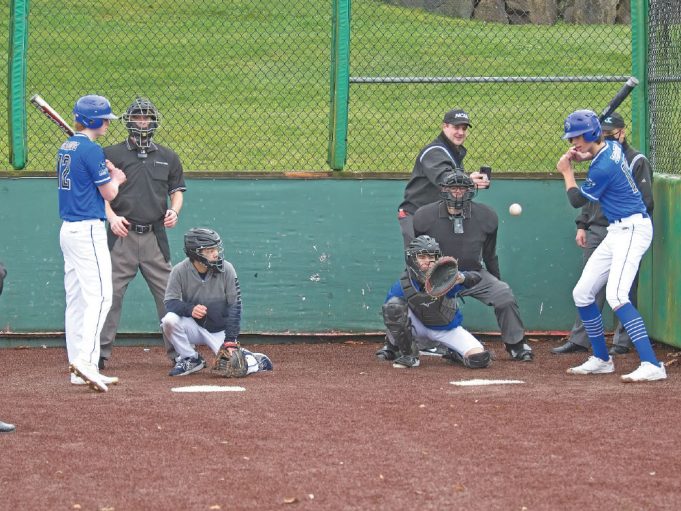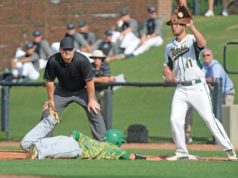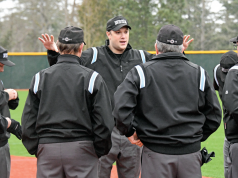Decades ago, when I got started, umpire clinics and camps were almost unheard of. (To me, a clinic is a one- or two-day event in a classroom-like setting, whereas a camp involves field work as well.) A few states — like Texas, where I was — had state and local associations that conducted meetings, but they were largely business and social affairs. There was little opportunity for instruction; we pretty much learned by trial and error and from the old heads’ war stories, often at a local watering hole.
Now we’re awash in camps and clinics that cover a vast array of rule, mechanic, leadership and philosophical topics. Although COVID-19 put a slight crimp on in-person gatherings for a couple of offseasons, they’ve started back up again now that the pandemic has abated. Umpires can benefit from them, but there are things to watch out for.
We attend camps and clinics for many reasons. Some umpires genuinely want to learn. Many go because their governing organization mandates attendance. For some folks, it’s a social affair. A goal (maybe the main one) of many umpires is to be seen and network in order to move up the ladder.
I’m not about to downplay the need to self-promote and network. People seldom come to us begging for our services, so we have to put ourselves out there. If one door opens and we take advantage of it, maybe another will. Indeed, my career is a story of meeting this person, who gave me this opportunity, which led to my meeting that person, and so on.
But this should be a secondary reason for attending a clinic or camp; the primary one should be educational. All of us can learn, no matter what development stage we’re in. It may come from what’s presented in the classroom or on the field or from chit-chatting with instructors and other umpires, who can give us insight into how things are done in reality rather than on paper at the levels to which we aspire.
If we go about it correctly, camps and clinics will afford us the opportunity to kill two birds with one stone. When I attended them as a college coordinator or clinician, I was more impressed with the folks who seemed to be there to learn and kept a low profile than I was with the ones who were too blatant (and maybe off-putting) in terms of self-promotion. If you make learning your primary objective, have a good personality, behave yourself and are low-key, and do whatever is asked of you with a smile, self-promotion will largely take care of itself. Because they impressed me with their interpersonal skills as well as the talent they displayed, I’ve given several umpires I’ve seen at camps a chance to work some games, and other supervisors have as well.
To the extent that self-promotion is an objective, don’t make it apparent. As I know from running a camp for 12 years, organizers invest a lot of effort in choosing topics and presenters, possibly setting up scrimmages (which can be a nightmare due to weather and logistical issues) and preparing instructional material. They may be offended if you come across like you’re not interested in this but instead are there to be seen. You won’t know this, moreover, because they’re unlikely to say anything, but they’ll file it in their memory bank.
With so many camp/clinic options to choose from, do due diligence. They’re not all the same, so identify your goals and do some research to find the one best suited to achieving them. Because the professional and amateur games are different, a pro umpire staff may not be what a high school or college aspirant needs. Some offer scrimmage opportunities; others don’t. If getting into a college conference is an objective, consider one with college coordinators in attendance. Word of mouth can be an outstanding resource; find out who has attended which camps or clinics and ask them about their experience.
Keep an open mind when you attend. In my time there were sea changes in thinking about mechanics, seeking help from partners, handling situations, etc. You may think what you’ve been doing is fine, but there may be a better way. Clinics are where ideas are swapped, thinking evolves and new information is imparted. If something isn’t appropriate given the policies of the group you’re in or the level of ball you work — for example, pro instructors talking about making catchers frame pitches for strikes to be called, which isn’t realistic in amateur ball — ignore it.
Don’t worry if you get conflicting messages about how to do something; often there’s no one “right” way. Mull over what you hear, discuss it with others, try it and discard what seems unhelpful and keep what works.
Don’t be a suck-up. It’s more obvious than most folks think, and it won’t help. Don’t be the, “Yes, but” type who replies to a suggestion to do X by saying, “Yes, but I’ve always done Y.” Don’t brag about what games you’ve had, how you ejected an entire dugout or how some coach told you how great you are (examples from my experience); it’s off-putting. Don’t express opinions too freely; others are there to hear the instructors, not you. Do ask questions. Presenters welcome this as long as it’s done politely to be productive.
The “down time” that occurs during breaks and after hours can be useful and productive, for this is when people let their hair down, war stories are told and networking occurs. If you handle things well, you may impress someone who can help you down the line. Exchange personal information so you can keep in touch with others. But be careful. Don’t be too boisterous or drink too much; if you carry on too loudly, you’ll stand out for the wrong reasons. I’ve seen this happen many, many times, and I can attest that the last person in whom a college coordinator is interested is someone who can’t control his behavior in public.
What's Your Call? Leave a Comment:
Note: This article is archival in nature. Rules, interpretations, mechanics, philosophies and other information may or may not be correct for the current year.
This article is the copyright of ©Referee Enterprises, Inc., and may not be republished in whole or in part online, in print or in any capacity without expressed written permission from Referee. The article is made available for educational use by individuals.


















